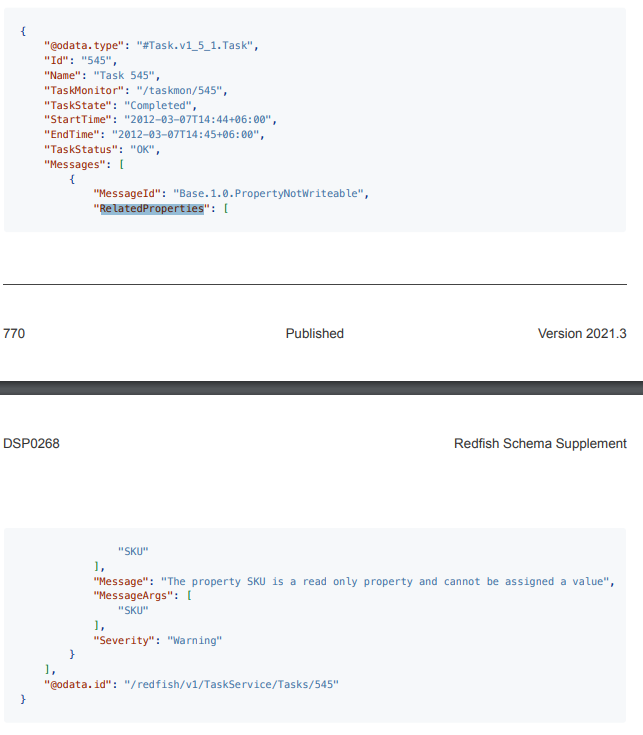|
|
Post by AMI_RythonCai on Nov 29, 2021 12:21:11 GMT
Hi I found that there is a different message format ("RelatedPropertise" ["SKU"], RelatedPropertise" ["#/InterfaceEnabled"]) in the DSP0266_1.14.0 and DSP0268_2021.3 documents. I want to ask that is it required add the " #/" in front of the value ? Or it has a standard format ? Please refer to image, Thanks   ![]() |
|
|
|
Post by mraineri on Nov 29, 2021 13:26:21 GMT
"RelatedProperties" is defined to follow RFC6901-style syntax for expressing a path to a particular property. This is to allow for a service to highlight properties within other objects of a resource. However, the "#" is really just meant to be used for URIs; RFC6901 defines the syntax as starting with a "/" character. We'll need to review this further and correct examples as we find them.
|
|
|
|
Post by AMI_archerwen on Nov 9, 2022 6:39:01 GMT
Hi, Is any update? Also here I have a error message example.  About the "RelatedProperties" describe for an "array" property. I think it is acceptable. or Do we need to do some fix? Thanks, Archer. |
|
|
|
Post by mraineri on Nov 9, 2022 13:54:15 GMT
As RFC6901 states, the # is used for URI fragments, and "RelatedProperties" does not contain URIs. I would expect these pointers to start with "/". I'll need to ask if others agree.
Looking at some other material, I see cases where local references are made in the URI fragment form with "#" at the beginning. This seems to be limited to usage in JSON Schema files with "$ref", which I suspect is defined as a URI. I also see other cases where tools will not allow a "#" because they're not expecting a URI reference.
|
|
|
|
Post by AMI_archerwen on Nov 10, 2022 4:25:08 GMT
So excepted "#", can I expect the other part (/Metrics/1/CollectionFunction) that we show is acceptable?
|
|
|
|
Post by mraineri on Nov 10, 2022 13:09:00 GMT
Yes, that's a valid RFC6901 JSON pointer that references the "CollectionFunction" property found in the first array member of the "Metrics" property.
|
|
|
|
Post by AMI_archerwen on Nov 11, 2022 3:36:09 GMT
Okay, thanks!!!
And about whether we need to start with "/" or not.
Kindly help to announce in here if you have a conclusion.
Thanks,
Archer.
|
|
|
|
Post by mraineri on Nov 11, 2022 14:17:54 GMT
Yes, it will need to start with a "/" since that's the indicator for the JSON pointer interpreter to begin at the root of the JSON payload.
|
|
|
|
Post by AMI_archerwen on Nov 14, 2022 6:31:06 GMT
Okay, Thanks.
|
|